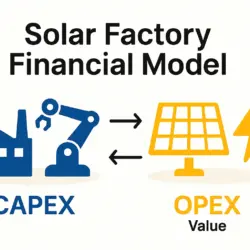Finland Pioneers Grid Stability with Nordics’ First Grid-forming battery storage System
In a significant milestone for Europe’s energy transition, Finland’s Merus Power has successfully commissioned the first grid-forming battery energy storage system (BESS) in the Nordic region. This groundbreaking project represents a vital step toward creating a more resilient and flexible power grid capable of integrating high levels of renewable energy.
Project Details: A Leap Forward in Energy Storage with Grid-forming battery storage
The cutting-edge 30 MW/36 MWh energy storage system was brought online in Valkeakoski, Finland, for the Swiss energy company Alpiq. This installation not only marks a technological first for the Nordics but also strengthens Alpiq’s role as a key provider of flexible energy solutions across the European market. The system utilizes advanced battery technology, which, like the components in solar energy, relies on a sophisticated supply chain and understanding of solar panel raw materials to achieve efficiency and reliability.
The Power of Grid-Forming Technology for Grid-forming battery storage
Unlike traditional grid-following systems that simply react to the grid’s existing state, Merus Power’s grid-forming BESS can proactively create and maintain grid stability. It acts as a digital backbone for the power system, independently managing voltage and frequency. This capability is crucial during grid disturbances or fault situations, where it can provide the inertia that was historically supplied by large, spinning turbines in fossil fuel power plants.
This technology is a game-changer for integrating intermittent renewable sources. As more wind and solar energy come online, the grid requires new ways to ensure stability. Grid-forming BESS provides this stability, ensuring that the power generated from countless solar installations can be seamlessly absorbed without jeopardizing the network. Understanding the basics of solar panel manufacturing helps appreciate the complexity of generating this clean energy in the first place.
Relevance for Germany’s Energiewende: Grid-forming battery storage Solutions
This development in Finland offers a powerful blueprint for Germany. As a leader in the Energiewende (energy transition), Germany faces similar challenges of maintaining grid stability with a growing share of renewables. For German homeowners and tenants with rooftop solar panels, grid-scale storage systems like this one are essential. They ensure that the clean energy fed into the grid contributes to a stable and reliable power supply for everyone, preventing curtailments and maximizing the value of renewable assets. The intricate solar panel manufacturing process that produces these panels is just the first step; grid-forming BESS is the next, ensuring their output can be used effectively.
Verified, Approved, and Deployed: Grid-forming battery storage in Action
The system’s reliability is not just theoretical. It has undergone a rigorous verification process by Fingrid, Finland’s Transmission System Operator (TSO), meeting all stringent requirements for large-scale grid-forming energy storage. This included demanding field tests and extensive modeling to prove its capability to strengthen the power grid.
Merus Power demonstrated remarkable agility, serving as the developer, supplier, and EPC (Engineering, Procurement, and Construction) contractor. The company successfully brought this advanced, in-house-developed technology to commercial use just two years after regulatory requirements were released, showcasing a path for rapid deployment of critical grid infrastructure.
As grid technology evolves, so does the technology that powers it. To gain a deeper insight into the production side of this energy revolution, consider exploring our free e-course on solar manufacturing.



